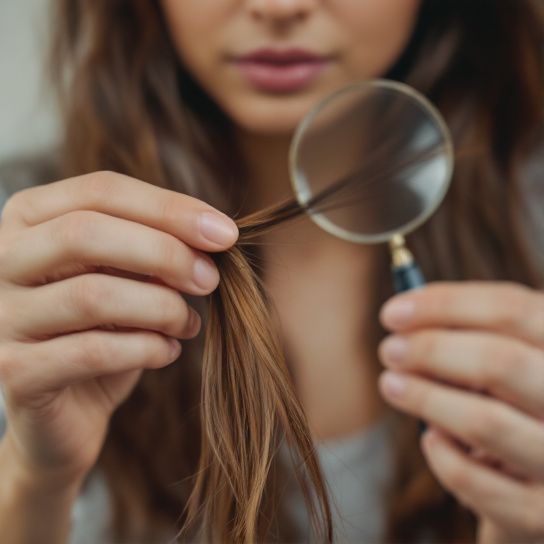
Let’s dive into something that might have been bugging you—or at least, making you scratch your head a bit more than usual: the link between **thyroid issues and hair health**. You’re here because you’ve probably noticed that your hair isn’t as thick or as lush as it used to be. Maybe there’s been excessive shedding, or your hair texture has changed. If you’ve been struggling with understanding why your once unstoppable mane has turned a bit, let’s say, tamer—hypothyroidism could be the culprit. Let’s chat about it.
Hypothyroidism: A Quick Rundown
First off, a mini crash course on hypothyroidism. In basic terms, it’s a condition where your thyroid gland, a butterfly-shaped organ at the base of your neck, underperforms. It doesn’t produce enough thyroid hormones, and this shortage can mess with a lot more than you think. Thyroid hormones influence metabolism, energy levels, mood, and yep, you guessed it—hair growth.
Think of your thyroid as a central player in your body’s energy management systems. When it slacks off, like pulling hard on engine brakes, things slow down. This slow-down affects different aspects of your health and wellbeing, resulting in problems you might not initially tie to thyroid function—like hair loss.
The Hairy Situation: How Hypothyroidism Leads to Hair Loss
Alright, so what exactly happens? When you’re struggling with hypothyroidism, your hair moves from the *anagen phase*, where it grows, into the *telogen phase*, where it rests, far too quickly. The sooner your hair hits this resting phase, the sooner it falls out. This cycle gets fast-tracked, leaving your hair looking thinner over time.
In simple terms, your body prioritizes which parts to supply with essential hormones, and unfortunately, hair sometimes takes a backseat. As a result, some people with hypothyroidism might notice excess shedding and thinning of the hair all over the scalp, but typically, they won’t go completely bald like you’d see with alopecia.
Other Signs Pointing to Hypothyroidism

Aside from hair loss, there are other tell-tale signs that your thyroid might not be performing at its best:
- Fatigue: No matter how long you’ve snoozed, you wake up feeling weighed down and tired.
- Weight gain: Those pounds pile on despite sticking to diets or exercise routines.
- Sensitivity to cold: You’re shivering more than most, even when everyone else is comfortable.
- Memory issues: Sometimes, you need to backtrack to recall precisely where you left that conversation penny.
Consulting a Doctor: When It’s Time to Get Checked
Convinced that hypothyroidism is behind your hair woes? Booking an appointment with your doctor should be the next stop. Your healthcare provider will likely suggest blood tests to check the levels of thyroid hormone (TSH and Free T4) in your body.
Labs can confirm an underactive thyroid, allowing doctors to prescribe the right medication to help correct hormone levels. And once your thyroid gets back in gear, your hair might slowly begin its comeback tour.
Bringing Back the Bounce: Tips for Managing Hair Loss
Managing hypothyroidism-induced hair loss isn’t just about treating the root cause—pun intended—it’s about making lifestyle adjustments to nurture what hair you’ve got and encourage those follicles to make a roaring return.
1. Get the Nutrition It Craves
Giving your body the right fuel is crucial. Hair is mostly made of protein, so keeping your diet rich in good proteins like beans, nuts, and seeds is beneficial. Iron, selenium, and zinc also support hair health—and you’ll find them in foods like spinach, Brazil nuts, and chips (the healthy baked kind, if you insist!).
2. Opt for Gentle Hair Care Products

Go easy on those harsh shampoos and styling products that might do more harm than good. Look for ones advertised as ‘gentle,’ or labeled for thinning hair. Less ‘super floral scent’ all in one cleaner, and more aloe vera smoothie.
3. Limit Heat and Chemical Use
Minimize your hair’s exposure to blow dryers, flat irons, and lightening agents. These tools and products sip away moisture and contribute to more breakage. If it sounds like something you’d use in home repairs—perhaps it’s not the best for delicate strands.
4. Stay Active for Better Circulation
Exercise isn’t just for burning calories, though it helps there. Regular walks, yoga sessions, or a little at-home cardio can boost circulation, encouraging blood flow and nutrients to reach your scalp. Trust me on this one—it does wonders.
5. Consider Supplements
If food’s your BBF (best bald-fighting friend), then supplements might be their supportive sidekick. You might want to try biotin or fish oil supplements—but always consult with a medical professional first before trying these out. Just because it’s packed in a cute little bottle doesn’t mean it’s the choice for everyone.
Navigating Myths and Missteps: What to Avoid
There’s a sea of suggestions out there when it comes to trying to solve hair loss concerns. Here are a few pitfalls to dodge on this hair recovery journey:

- Obsessing over quick fixes: Solutions involving miracles in a bottle may lead to more frustration, and unnecessary strain on those already vulnerable roots.
- Skipping the doctor: Luxuriating in hope while skipping out on accurate interventions doesn’t typically pan out for the better.
- Overwashing: We get it, you want clean hair often. But frequent washing can strip away natural oils, leading to irritation or worsening damage.
Finding Everyday Encouragement in Small Wins
Okay, so you’re doing all the things. Some days you can notice the changes, and at other times, it feels like a never-ending cycle of wait. Here is a little encouragement: progress is progress, no matter how small. Recognize those small wins: fewer strands in the shower; a little volume on top; an unexpected compliment on your new healthy sheen.
Reevaluating Stress Beliefs: Mental Well-being Is Physical Well-being
Our journeys don’t exist in vacuum tubes; hair loss affected by stress and mental strain isn’t an exception. Incorporate relaxation practices into your week. Find what calms you—a walk somewhere green, some journaling, warm tea with a pause—and do a bit of that often. It’ll not only help you feel rejuvenated but also, hopefully, balance some of that inner chaos that my steer your body’s healing.
Conclusion: Give Yourself Some Grace
Remember, you’re not alone in this hair and thyroid dance. Thousands navigate hypothyroidism and the related symptoms, including hair loss. Sustainable changes often take time. Acknowledge where you’re at and do a little nurturing for both your body and mind. If it sometimes feels rocky, circle back around to seeking advice, garner more support, and stay informed.
Let’s face it—our bodies might not always cooperate as we wish, but each of those gentle steps, every thoughtful brushstroke, or diet change nurtures your vibrant health-to-come.
Embrace today knowing that with the right knowledge and persistence, you’re creating the environment your hair needs to bounce back.
Frequently Asked Questions
What is the link between hypothyroidism and hair loss?
Hypothyroidism, or an underactive thyroid, can cause hair loss due to the insufficient production of thyroid hormones, which are essential for the growth and maintenance of hair follicles. This condition can lead to hair thinning, particularly a gradual and widespread thinning, and may also affect hair on other parts of the body such as the eyebrows and pubic area[1][3][5>.
How does hyperthyroidism affect hair loss compared to hypothyroidism?
Both hyperthyroidism (an overactive thyroid) and hypothyroidism can cause hair loss, but the patterns differ. Hyperthyroidism tends to cause more sudden and noticeable hair loss on the scalp, while hypothyroidism results in more gradual and widespread hair thinning. In both cases, the hair loss is often reversible with treatment of the underlying thyroid condition[1][3][5>.
What are the typical symptoms of thyroid-related hair loss?
Thyroid-related hair loss can manifest as diffuse hair thinning, particularly on the scalp, and may also include loss of hair from the eyebrows, armpits, and other body parts. The hair may become dry, coarse, and slow-growing. Additionally, the condition can lead to a scalp disorder known as telogen effluvium, where a large number of hair roots enter the resting stage of the hair cycle too early[1][3][5>.
How is thyroid-related hair loss treated?
Treatment for thyroid-related hair loss typically involves addressing the underlying thyroid condition. Medications such as levothyroxine are prescribed to balance the thyroid hormone levels. Once the thyroid hormone levels are normalized, the hair loss usually improves and may even reverse over time. Additionally, maintaining a balanced diet and being gentle with hair can help promote hair growth and improve hair condition[1][3][5>.
References


Leave a Reply